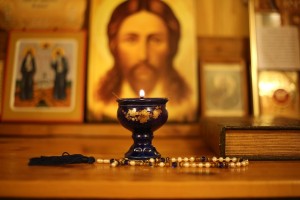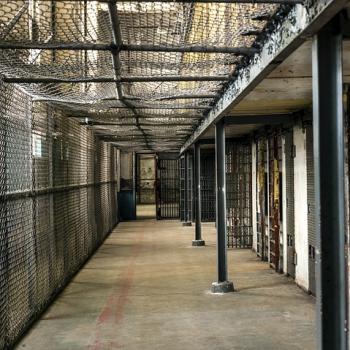
[This account was written for me by a Brooke Alker Gregory. I am sharing it with her permission, as a reminder to all of us in the Apostolic Churches of how painful and traumatic spiritual abuse by a confessor can be to a soul, and how important it is to speak out and believe survivors.– Mary Pezzulo]
“I hate silence when it is time to speak.”
That was my patron saint’s only recorded reply when she was beaten for her iconodule beliefs on the orders of Emperor Theophilos, a man who years before she’d publicly spurned for a history-making literary and monastic career. Now, centuries later and under her protection, it’s my time to speak. But I have plenty more than her to say. It is as it were a burning fire shut up in my bones, and I am weary with holding it in, and I cannot.
Before we begin, to save everyone some time, note that I’m not interested in being anyone’s idea of a perfect victim—if a victim is what I am; I don’t particularly feel like one. I am angry, and I rarely handle it conveniently or nicely. I have every bit of ill-will toward the guilty party as you assume I do. I don’t particularly care if I ruin someone’s “career” or “position” (which isn’t likely to happen anyway)—the anonymity in my story has nothing to do with protecting anyone but myself. I am neither particularly polite, nor kind, nor innocent. None of this makes what I have to say any less true, and I don’t have the energy or inclination to try to further convince anyone on this point. So. Shall we begin?
I was received into the Eastern Orthodox Church at the age of 19. My boyfriend at the time soon followed after me. Two years later I left my hometown for college and quickly found a very nice local parish for myself—the only parish around for quite nearly a hundred miles. However, as occasionally happens in the Orthodox Church, the priest at the parish was not a confessor yet and so my usual habit of frequent confession was interrupted. As a fairly new and fervent convert, this caused me no small amount of spiritual distress.
Sometime during 2012, most likely during Lent, though it’s difficult for me to remember, a solution presented itself when I learned that the monastery a few towns over offered confession. I’d been there once before and was impressed by my short visit—the timeless flow of time, vespers in the near-dark, the silence you could taste in the antidoron and trapeza lentils as well as hear beneath the gray-barked trees. I looked forward to going back, and made an appointment as soon as I could, full of joy at the prospect of being absolved after a long stretch without the sacrament. I didn’t tell anyone I was going, spontaneous as my decision was. And so there was no one to warn me what I was getting myself into.
Unbeknownst to me, this monastery was and is one of 20 or so satellites of St. Anthony’s Monastery hundreds of miles away in Florence, Arizona, under the guidance of one Elder Ephraim. That June, St. Anthony’s would become even more notorious than it already was after a troubled young novice—a convert—who had left the previous year returned and killed himself on the monastery grounds. After his death, his parents sketched a deeply troubling picture of his novitiate. He was not permitted to see his parents or to leave, not even when his grandmother was terminally ill. His personal correspondence was opened and read by the Elder, and redacted to hide information about the seriousness of his grandmother’s condition. Already tall and slender, he dropped 150 pounds and images from the time show him appearing unhealthily gaunt. His limited correspondence with his family increasingly revealed signs of a dire and untreated mental illness. Before leaving, he claimed that he had been threatened by other monks and the Elder, and that the Elder was a “charlatan.” The monastery has denied these claims, and the claims of his parents that he was brainwashed.
Even before this, St. Anthony’s and its affiliated monasteries were connected with rumored strange practices and beliefs. Some of the Elder’s writings contain references to The Protocols of the Elders of Zion, a deeply Anti-Semitic text fabricated in the early 20th century as a Jewish world domination manual. Several couples have published their stories online of being ordered by the Elder and those beneath him to live as “brother and sister,” and even to live as monastics in separate monasteries. Others report being told, contrary to Church teaching and canon law, that marriage is inherently sinful and that monasticism is the only sure path to salvation. A common thread in all the various accounts of Elder Ephraim’s monasteries is that unquestioned obedience to the Elder’s will is law for both monks and pilgrims—a general practice in Orthodoxy’s traditional spiritual father paradigm to which even relatively sane writers like Kallistos Ware attest. Orthodoxy’s tradition of spiritual fatherhood can be very beautiful, but more often than not, its insistence on blind obedience and the elder’s sole responsibility for one’s salvation make those seduced by it extremely vulnerable to abuse. Laity have periodically appealed to the hierarchy to reign in the “Ephraimites” and Ephraim’s monasteries, but nothing substantial has been done.
I didn’t know any of this when I arrived at the monastery on a dull, gray afternoon in my frumpily modest monastery clothes. I was just happy to be there, to drink in the silence, to be absolved. Cleansed.
I made my way to the church, a marble and dark-wood dream of a sanctuary built in the old style with no pews and Christ Pantokrator in His dome, looking sternly down on the whole incense-laden microcosm. I assumed my confession would take place there as it had always done in the various parishes I’d belonged to: the confessor and us both sitting face to face before the iconostasis icon of Christ, not in the dreaded “box” as I smugly referred to the dour Roman confessional. To my confusion, there were still people milling about the sanctuary. And where was the confessor?
As if an answer, a volunteer showed me over to a door in the narthex that I had assumed went to a bathroom.
“Father will be with you shortly,” she said in a soft, kind voice. “He usually does confession in a question-answer format, but if you don’t want to, that’s okay. I’ll let him know.” Not wanting to impose on his usual routine or cause difficulties, I told her that the usual way would be fine with me. Better, even. It sounded much more thorough. After a few minutes, the door opened and I stepped inside.
I found myself in a tiny room no bigger than a closet, with a tiny bench in front of a monk seated on a stool. As I took my seat, I saw that he was surprisingly young with almost no trace of gray in his beard. I also noticed we were so close our knees almost touched. Unconsciously, I sat with my back pressed as hard as I could to the wall behind me. After preliminary introductions, we began. Entirely from memory, he went through a long list of sins which were more or less easy to answer. No thievery, murder, or apostasy to report this time around. From what I can remember the categories were more or less general. Until they weren’t.













